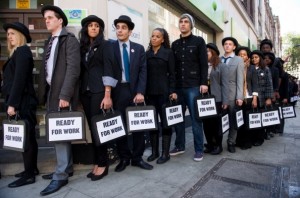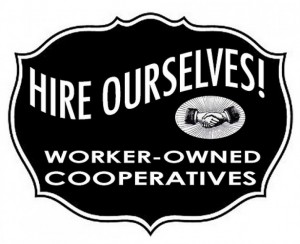Cooperatives Offer Solutions for Youth Unemployment
Apr 29th, 2015 | By admin | Category: Youth RightsBy Kimberly Absher, guest youth blogger, www.howmany.org.
A recent Guardian article said youth unemployment “is an issue set to destabilise fragile economies, become a breeding ground for extremism, and leave a generation permanently scarred.” Indeed, it is cause for concern when not only considering today’s out-of-work young people, but also the workforce of tomorrow.
According to the World Data Bank’s estimated unemployment statistics(2013) for 15-24 year olds, Bosnia and Herzegovina have the highest rates in the world with 60.4 percent, with Croatia, Macedonia, South Africa, Spain, and Greece close behind, all with unemployment over 50 percent. The United States and United Kingdom rates come in at 15.8 and 20.3, respectively.With young people challenged to make a living with the current economic model, what solutions do we have? Cooperatives are one option. Cooperatives employ 20 percent more people than multi-national corporations, and co-ops have not only survived the recession, but in the United Kingdom alone grew 21 percent since 2008 to over £35 billion.
One type in particular – worker co-ops – promote gainful employment on the premise that workers have a say in how the business runs, where all earn an equitable wage. The United States has over 350 democratic workplaces, 100 of which are members of the United States Federation of Worker Cooperatives. The USFWC website distinguishes two pieces of criteria a worker cooperative must have: (1) worker-members invest in and own the business together, and it distributes surplus to them and (2) decision-making is democratic, adhering to the general principle of one member-one vote.
AltGen is a cooperative startup in the UK. According to their website, the founder, Rhiannon Colvin, decided after applying for “endless jobs and unpaid internships,” that young people could create something better if they worked together. Now AltGen promotes the formation of worker cooperatives as a solution to youth unemployment by offering how-to guides and support.
Twenty-four year-old Katie Campbell has been the executive director of Aynah for three years. Aynah educates the public, particularly university students, about the adaptability and overall value of cooperatives. After learning about the cooperative model from Ethiopian farmers, Campbell says she was amazed at how co-ops transform not only the economics of a community, but social and psychological aspects as well.
Campbell thinks the cooperative model is a great way for young people to create work and economic value for themselves. “I think that’s one of the neatest things we’re teaching. It’s like, now you know about the co-op model so if you and your friends after college, or you and a group of peers have a common goal and common need, you know how a co-op works,” she said. “You have the resources to create your own job if our current economic system in the U.S. is not providing for you.”
In 2013, 5.6 percent of college graduates were unemployed, and many more were working jobs that don’t require a college degree. A major obstacle, of course, is the chicken and the egg scenario: employers want to hire people with experience, but students need the jobs in order to get the experience.
To overcome this challenge, a different type of cooperative concept promotes students’ abilities to get full-time employment in their fields of study. It’s called Cooperative Education, an idea that has been carried out for over 125 years in the United States, and only growing in relevancy today.
Co-op programs vary depending on the institution. At Mississippi State University, students are matched with companies in their realm of study. Students spend three semesters working for one employer and receiving a salary, in addition to vital work experience. 80 percent of students who complete the program are offered a full-time position by their co-op employer, said Scott Maynard, MSU Career Center Director. In this sense, “co-op” means a cooperation between the school and employer.
“I think you’re going to see a trend of more and more schools pushing their students to get a glimpse of what it’s like outside of school before they graduate.” Maynard said, “We have students that come to Mississippi State specifically to participate in our co-op program because they know that’s their ticket to get in front of an established employer that they’re interested in working for.”
Hundreds of U.S. colleges and universities offer some type of cooperative education program. The Cooperative Education & Internship Association (CEIA) provides a full directory. For information about the cooperative model, Community-Wealth.org offers an introduction here.
Kimberly Absher enjoys combining her love of writing and creating social change as often as possible. She writes about health, gender, personal development, and more at kimberlyabsherwrites.com.


